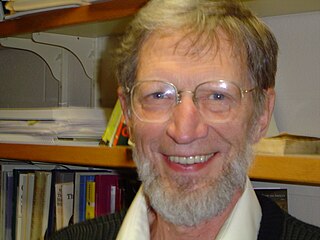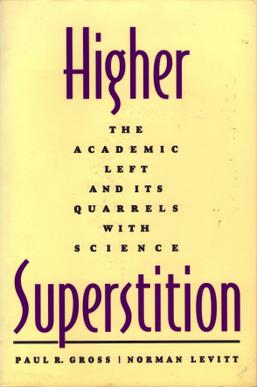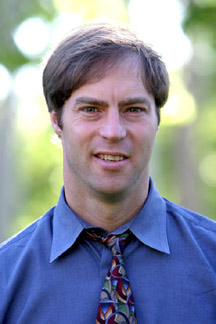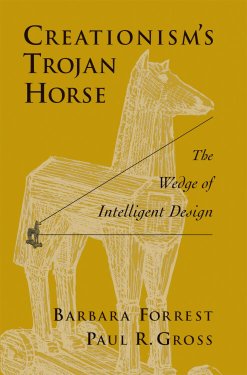The Discovery Institute (DI) is a politically conservative think tank that advocates the pseudoscientific concept of intelligent design (ID). It was founded in 1991 in Seattle as a non-profit offshoot of the Hudson Institute.

William Albert Dembski is an American mathematician, philosopher and theologian. He was a proponent of intelligent design (ID) pseudoscience, specifically the concept of specified complexity, and was a senior fellow of the Discovery Institute's Center for Science and Culture (CSC). On September 23, 2016, he officially retired from intelligent design, resigning all his "formal associations with the ID community, including [his] Discovery Institute fellowship of 20 years". A February 2021 interview in the CSC's blog Evolution News announced "his return to the intelligent design arena".

Alvin Carl Plantinga is an American analytic philosopher who works primarily in the fields of philosophy of religion, epistemology, and logic.
Phillip E. Johnson was a UC Berkeley law professor, opponent of evolutionary science, co-founder of the pseudoscientific intelligent design movement, author of the "Wedge strategy" and co-founder of the Discovery Institute's Center for Science and Culture (CSC). He described himself as "in a sense the father of the intelligent design movement". He was a critic of Darwinism, which he described as "fully naturalistic evolution, involving chance mechanisms and natural selection". The wedge strategy aims to change public opinion and scientific consensus, and seeks to convince the scientific community to allow a role for theism, or causes beyond naturalistic explanation, in scientific discourse. Johnson argued that scientists accepted the theory of evolution "before it was rigorously tested, and thereafter used all their authority to convince the public that naturalistic processes are sufficient to produce a human from a bacterium, and a bacterium from a mix of chemicals."

Higher Superstition: The Academic Left and Its Quarrels with Science is a 1994 book about the philosophy of science by the biologist Paul R. Gross and the mathematician Norman Levitt.
John Corrigan "Jonathan" Wells is an American theologian and advocate of the pseudoscientific argument of intelligent design. Wells joined the Unification Church in 1974, and subsequently wrote that the teachings of its founder Sun Myung Moon, his own studies at the Unification Theological Seminary and his prayers convinced him to devote his life to "destroying Darwinism." The term Darwinism is often used by intelligent design proponents and other creationists to refer to the scientific consensus on evolution. He gained a PhD in religious studies at Yale University in 1986, then became Director of the Unification Church's inter-religious outreach organization in New York City. In 1989, he studied at the University of California, Berkeley, where he earned a PhD in molecular and cellular biology in 1994. He became a member of several scientific associations and has published in academic journals.

The Center for Science and Culture (CSC), formerly known as the Center for the Renewal of Science and Culture (CRSC), is part of the Discovery Institute (DI), a conservative Christian think tank in the United States. The CSC lobbies for the inclusion of creationism in the form of intelligent design (ID) in public-school science curricula as an explanation for the origins of life and the universe while trying to cast doubt on the theory of evolution. These positions have been rejected by the scientific community, which identifies intelligent design as pseudoscientific neo-creationism, whereas the theory of evolution is overwhelmingly accepted as a matter of scientific consensus.
The intelligent design movement is a neo-creationist religious campaign for broad social, academic and political change to promote and support the pseudoscientific idea of intelligent design (ID), which asserts that "certain features of the universe and of living things are best explained by an intelligent cause, not an undirected process such as natural selection." Its chief activities are a campaign to promote public awareness of this concept, the lobbying of policymakers to include its teaching in high school science classes, and legal action, either to defend such teaching or to remove barriers otherwise preventing it. The movement arose out of the creation science movement in the United States, and is driven by a small group of proponents. The Encyclopædia Britannica explains that ID cannot be empirically tested and that it fails to solve the problem of evil; thus, it is neither sound science nor sound theology.

Stephen C. Meyer is an American author and former educator. He is an advocate of intelligent design, a pseudoscientific creationist argument for the existence of God. and helped found the Center for Science and Culture (CSC) of the Discovery Institute (DI), which is the main organization behind the intelligent design movement. Before joining the DI, Meyer was a professor at Whitworth College. Meyer is a senior fellow of the DI and director of the CSC.
Theistic science, also referred to as theistic realism, is the pseudoscientific proposal that the central scientific method of requiring testability, known as methodological naturalism, should be replaced by a philosophy of science that allows occasional supernatural explanations which are inherently untestable. Proponents propose supernatural explanations for topics raised by their theology, in particular evolution.

Of Pandas and People: The Central Question of Biological Origins is a controversial 1989 school-level supplementary textbook written by Percival Davis and Dean H. Kenyon, edited by Charles Thaxton and published by the Texas-based Foundation for Thought and Ethics (FTE). The textbook endorses the pseudoscientific concept of intelligent design – the argument that life shows evidence of being designed by an intelligent agent which is not named specifically in the book, although proponents understand that it refers to the Christian God. The overview chapter was written by young Earth creationist Nancy Pearcey. They present various polemical arguments against the scientific theory of evolution. Before publication, early drafts used cognates of "creationist". After the Edwards v. Aguillard Supreme Court ruling that creationism is religion and not science, these were changed to refer to "intelligent design". The second edition published in 1993 included a contribution written by Michael Behe.
Percival William Davis, also known as Bill Davis, is an American author, young earth creationist, and intelligent design proponent.

Neo-creationism is a pseudoscientific movement which aims to restate creationism in terms more likely to be well received by the public, by policy makers, by educators and by the scientific community. It aims to re-frame the debate over the origins of life in non-religious terms and without appeals to scripture. This comes in response to the 1987 ruling by the United States Supreme Court in Edwards v. Aguillard that creationism is an inherently religious concept and that advocating it as correct or accurate in public-school curricula violates the Establishment Clause of the First Amendment.

Steve William Fuller is an American social philosopher in the field of science and technology studies. He has published in the areas of social epistemology, academic freedom, and in support of intelligent design and transhumanism.
Nicholas J. Matzke is the former Public Information Project Director at the National Center for Science Education (NCSE) and served an instrumental role in NCSE's preparation for the 2005 Kitzmiller v. Dover Area School District trial. One of his chief contributions was discovering drafts of Of Pandas and People which demonstrated that the term "intelligent design" was later substituted for "creationism". This became a key component of Barbara Forrest's testimony. After the trial he co-authored a commentary in Nature Immunology, was interviewed on Talk of the Nation, and was profiled in Seed as one of nine "revolutionary minds".

Creationism's Trojan Horse: The Wedge of Intelligent Design is a 2004 book by Barbara Forrest and Paul R. Gross on the origins of intelligent design, specifically the Discovery Institute's Center for the Renewal of Science and Culture and its wedge strategy. The authors are highly critical of what they refer to as intelligent design creationism, and document the intelligent design movement's fundamentalist Christian origins and funding.
The Intelligent Design network, inc. is a nonprofit organization formed in Kansas to promote the pseudoscientific principle of intelligent design. It is based in Shawnee Mission, Kansas. The Intelligent Design Network was founded by John Calvert, a corporate finance lawyer with a bachelor's degree in geology, and nutritionist William S. Harris. Its self-described mission is "to promote evidence-based science education with regard to the origin of the universe and of life and its diversity" and "to enhance public awareness of the evidence of intelligent design and living systems."
John G. West is a senior fellow at the Seattle-based Discovery Institute (DI), and associate director and vice president for public policy and legal affairs of its Center for Science and Culture (CSC), which serves as the main hub of the pseudoscientific Intelligent design movement.
Walter L. Bradley is a retired professor of engineering, old Earth creationist and an advocate of intelligent design.







